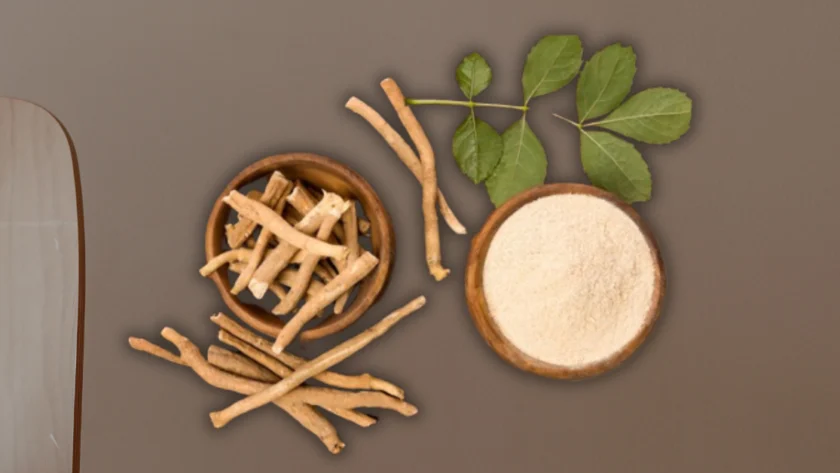Ashwagandha, or Indian ginseng, has been a go-to herb in Ayurvedic medicine for over 3,000 years. It’s like a superhero with its anti-inflammatory, anti-stress, anti-oxidizing, sleep-inducing, and even drug-withdrawal properties. Now, let’s talk about how this amazing herb can do wonders for your hair and skin:
Benefits of Ashwagandha for Skin
Glowing Skin:
So, imagine Ashwagandha as your skin’s superhero. It’s got these awesome antioxidant powers that boost your blood circulation and give your immune system a high-five. And guess what? All that goodness reflects on your face, leaving you with this amazing, radiant glow.
Anti-Aging Magic:
Now, who doesn’t want to turn back the clock a bit? Ashwagandha’s like the wizard of anti-aging. Packed with antioxidants, it goes on a mission against those pesky free radicals. The result? Sayonara age spots, wrinkles, and blemishes. It’s like a superhero for your skin, fighting the villains of aging.
Wound-Healing Wonder:
Got a battle scar? Ashwagandha to the rescue! Mix it up into a liquid concoction, and it turns into this ointment superhero that treats cuts, bruises, and inflamed skin. It’s like having a healing potion straight from nature.
Dry Skin’s BFF:
If your skin’s feeling like a desert, Ashwagandha’s your oasis. It’s like a tall glass of water for your skin. With its moisturizing powers, it’s often the go-to prescription for dry and rough skin. Hydration station, anyone?
Inflammation Fighter:
Acne and inflammation, meet your match – Ashwagandha! This ancient healer, with its roots and leaves, steps in like the wise elder of Ayurveda to tackle those pesky skin disorders. It’s like the calming force your skin didn’t know it needed.
Cortisol Crusader:
Ever heard of cortisol? It’s like stress in hormone form, and it can wreak havoc on your skin. But fear not! Ashwagandha swoops in, bringing down cortisol levels like a true hero. And that’s not all – it kicks up DHEA, a hormone that’s like the sidekick to estrogen and testosterone, keeping your skin in check.
Collagen Booster:
You know that magic word for youthful skin? Collagen! Ashwagandha has the power to crank up estrogen levels, and together with DHEA, they’re like the dynamic duo of collagen production. Picture your skin getting stronger, more supple, and just overall fabulous.
Skin Hydration Champ:
Let’s talk essentials for healthy skin – hyaluronan for hydration, elastin for that bounce, and collagen for the strong and steady. Ashwagandha’s like the coach, pushing your skin to produce these elements for the ultimate skin health. It’s like a spa day for your face, courtesy of nature’s own beauty secret.
Benefits of Ashwagandha for Hair
Promotes Hair Growth:
Ashwagandha, derived from the root, does wonders for your hair.The extracts boost telomerase activity, which is a fancy way of saying it helps your skin cells stay healthier for longer. This, in turn, stimulates hair growth and acts like a shield against damage to your hair follicles, scalp, and tissues. So, if you’re dreaming of lush locks, Ashwagandha might just be your secret weapon.
Keeps Grays at Bay:
Nobody likes unwanted gray hair sneaking in, right? Well, Ashwagandha seems to have your back on that too. Studies suggest that it can actually prevent those pesky grays from making an appearance. So, not only does it help your hair grow, but it also helps it stay its natural, youthful color.
Fortifies Hair Roots:
Ashwagandha acts as a personal trainer for your hair roots. It’s like giving them a strength workout! This herb has the power to make your hair roots stronger, reducing the chances of hair fall. So, if you’re tired of finding strands on your pillow or in the shower, Ashwagandha might be the solution you’ve been looking for.
Calms Scalp Inflammation:
Sometimes our scalp can get a bit cranky, right? It might get irritated or inflamed, causing discomfort. Well, Ashwagandha steps in as a peacekeeper. Thanks to its anti-inflammatory properties, it can soothe your scalp, providing relief from that annoying inflammation. It’s like a spa day for your head!
How to use Ashwagandha for skin and hair?
Ashwagandha can be used for skin and hair in various ways. Here are some ways to use Ashwagandha for skin and hair:
For Skin
- Ashwagandha Face Mask:
- Create a nourishing face mask by combining 1 teaspoon of Ashwagandha powder with equal parts honey and yogurt.
- Apply the mixture evenly on your skin and let it sit for approximately 15 minutes.
- Rinse off the mask with water to reveal refreshed and revitalized skin.
- Create a nourishing face mask by combining 1 teaspoon of Ashwagandha powder with equal parts honey and yogurt.
- Ashwagandha Ointment:
- Utilize the liquid form of Ashwagandha to make an ointment for treating cuts, bruises, and inflamed skin.
- Apply the liquid mixture directly to affected areas to harness Ashwagandha’s potential for skin healing.
- Utilize the liquid form of Ashwagandha to make an ointment for treating cuts, bruises, and inflamed skin.
- Ashwagandha Moisturizer:
- Combat dry and rough skin by incorporating Ashwagandha into your moisturizing routine.
- Its moisturizing properties can help alleviate dryness, leaving your skin feeling smoother and more hydrated.
- Combat dry and rough skin by incorporating Ashwagandha into your moisturizing routine.
For Hair
- Ashwagandha Hair Mask:
- Form a hair mask by mixing 2–3 tablespoons of Ashwagandha powder with water until it forms a paste.
- Apply the paste directly to your scalp or hair roots and leave it on for about 20 minutes.
- Rinse off the mask to promote healthier and nourished hair.
- Form a hair mask by mixing 2–3 tablespoons of Ashwagandha powder with water until it forms a paste.
- Ashwagandha Hair Oil:
- Blend equal parts Ashwagandha powder and coconut oil to create a potent hair treatment.
- Massage the mixture into your scalp, ensuring even distribution.
- Allow it to sit for 15 minutes before washing it out with lukewarm water, promoting improved scalp health and lustrous hair.
- Blend equal parts Ashwagandha powder and coconut oil to create a potent hair treatment.
- Ashwagandha Supplements:
- Consider Ashwagandha supplements for overall skin and hair health, but always consult with a dermatologist before starting any supplement regimen.
- Seek professional advice to determine the appropriate dosage and to avoid any potential adverse reactions.
- Consider Ashwagandha supplements for overall skin and hair health, but always consult with a dermatologist before starting any supplement regimen.
What is the best time to use Ashwagandha?
Determining the optimal time to take Ashwagandha can be influenced by individual preferences and health objectives. General guidelines suggest considering the following factors
Morning Routine for General Health:
- If you are incorporating Ashwagandha into your daily supplement routine to support overall health, the morning is often considered an ideal time.
- Taking Ashwagandha alongside other vitamins or supplements in the morning can help establish a consistent routine.
Promoting Sleep with Ashwagandha:
- For those seeking to leverage Ashwagandha’s potential to improve sleep quality, an alternative approach is to consume Ashwagandha powder as part of a nighttime ritual.
- Moon milk, which incorporates Ashwagandha powder, can be a relaxing bedtime beverage, potentially aiding in unwinding and promoting a more restful sleep.
Is Ashwagandha safe for everyone?
It is crucial to recognize that the regulatory oversight of supplements is limited, leading to uncertainty about the precise composition of these products. Ashwagandha, a popular herbal supplement, is no exception. Individuals with certain health conditions should exercise caution when considering its use.
One notable concern is that Ashwagandha has the potential to stimulate the immune system. Consequently, individuals with autoimmune diseases should avoid taking Ashwagandha, as it may exacerbate their condition. Furthermore, if you are planning to undergo surgery and are currently taking Ashwagandha, it is imperative to inform your healthcare provider. The supplement should be discontinued at least two weeks before any scheduled procedure to mitigate potential complications.
Ashwagandha’s influence on thyroid hormone levels is another factor to consider. The supplement has been associated with an increase in thyroid hormone levels. Given this effect, individuals with thyroid disorders should exercise caution and consult their healthcare provider before incorporating Ashwagandha into their regimen.
Moreover, Ashwagandha has the potential to interfere with certain medications. It is crucial for individuals taking prescription medications to inform their healthcare provider about their Ashwagandha supplementation. This disclosure will enable the healthcare provider to assess potential interactions and make necessary adjustments to medication regimens.




